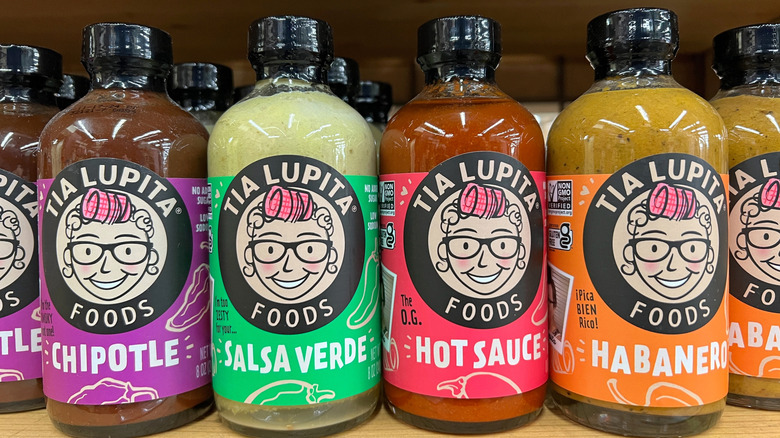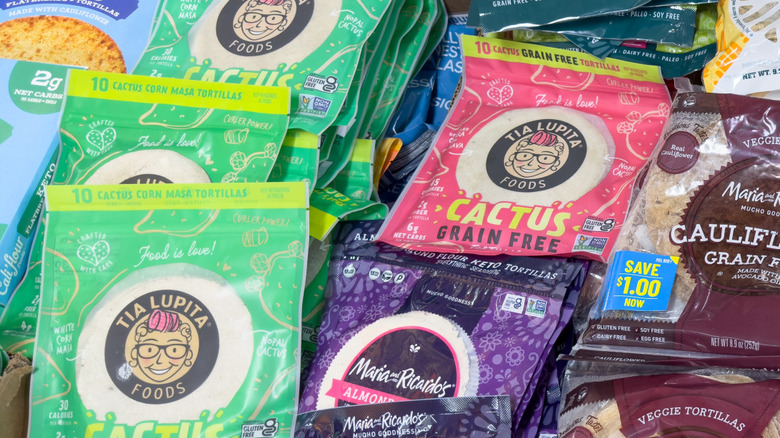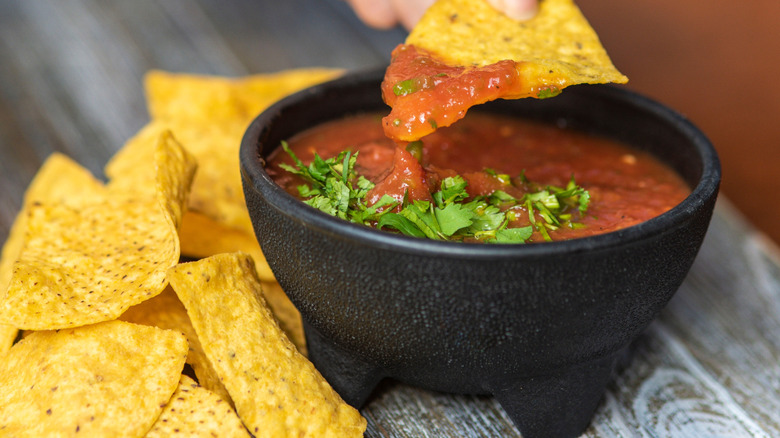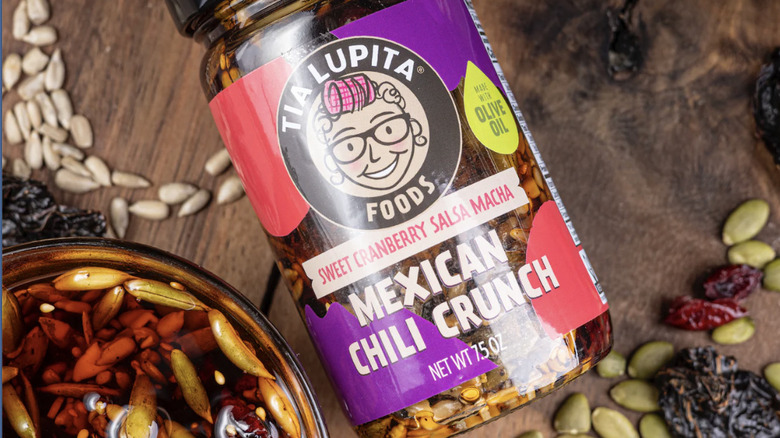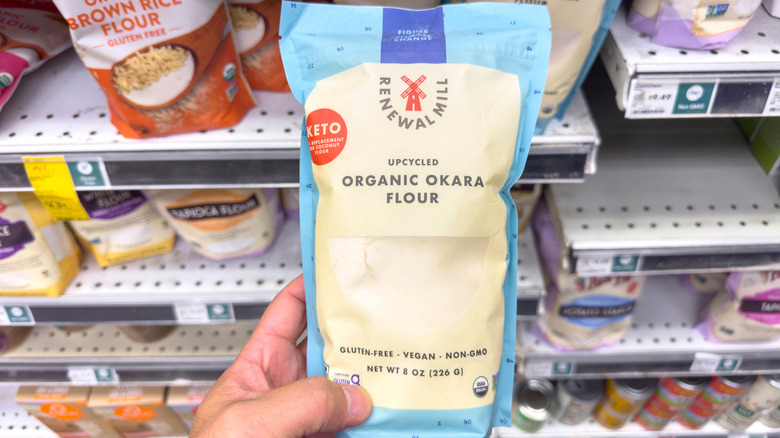Tia Lupita Foods: Here's What Happened After Shark Tank
ABC's "Shark Tank" has featured many unique food brands, from vegan cookie dough to pizza cupcakes. One of its most notable was Tia Lupita Foods — a small-batch hot sauce, salsa, and chips company. Hector Saldivar founded the business after facing a possible job relocation to North Carolina.
Tia Lupita Foods, named for Salvidar's mother, launched in 2018 and offers sauces made from natural ingredients with low sodium. There aren't any binders, preservatives, gluten, or added sugars in these products. Saldivar found that many of the hot sauces in America were runny and based on vinegar. But his mother's recipe used the pepper — jalapeno, habanero, or chipotle — to make the sauce.
Although Saldivar self-funded his start-up, the desire to expand his business required more money. That's when he turned to "Shark Tank" for financial help. Saldivar began his pitch by asking who liked tacos. Daymond John showed interest in Tia Lupita's profitability, but he didn't have a passion for the business. Frankly, he also didn't think it would grow. Mark Cuban was concerned about the finances and the scalability of the brand, while Lori Greiner and Barbara Corcoran were focused on the amount of debt Tia Lupita carried. It made the business appear too risky.
Despite the initial rejection, Saldivar continued his pitch, focusing on the ingredients in his products. He emphasized the use of nopales, or cactus (yes, you can eat it). Saldivar also spoke of the challenges he dealt with when combining innovation and authenticity in a Mexican brand. Then he asked for a $500,000 investment in exchange for 5% equity in the company.
What happened to Tia Lupita Foods on Shark Tank?
Kevin O'Leary, a passionate cook and a fierce negotiator, was the only one who was truly interested in investing in Tia Lupita Foods. Its bold flavored, grain-free tortilla chip was something Kevin — also known as Mr. Wonderful — had been looking for. Although he was intrigued by the business, Kevin's assistance wouldn't come easy. Mr. Wonderful wanted to make the $500,000 a loan with a 12.5% interest rate. He also wanted 10% equity in Tia Lupita.
The other Sharks didn't think Salvidar should take the deal, but he persisted and engaged in some intense negotiations. Eventually, a suitable agreement was reached, and Tia Lupita Foods had its funding. Salvidar took $500,000 as a line of credit at 12.5% interest and received 5% non-dilutable equity. Why did O'Leary decide to invest? "I only invest in businesses that have the potential to be the 'crunch' in the market, and Tia Lupita Foods has the right recipe for success — a crispy investment that satisfies both taste buds and portfolios," he said.
Tia Lupita Foods after Shark Tank
After the episode of "Shark Tank" aired, Tia Lupita Foods's website had about 30,000 visitors in one week — a serious increase from the usual 1,500. Then, the brand was able to expand its presence into major retail stores. By late 2023, Tia Lupita Foods was available in over 4,000 resellers in the United States including Target, Walmart, Kroger, Ralphs, Albertsons, Vons, Bristol Farms, Erewhon, the Fresh Market, and Publix. Eventually, Costco Wholesale Canada and Save-On-Foods also carried Tia Lupita Foods.
In 2020, Tia Lupita Foods joined forces with Renewal Mill, a food and ingredient company, to produce grain-free tortillas using its upcycled okara flour. And in October 2023, the business secured another $2.6 million in seed funding from two Mexican investors — Santatera Capital and GBM Ventures. Other backers of the company include PepsiCo Greenhouse Collaborative Accelerator and Tompkins Square Ventures. With an estimated 10% yearly growth rate, the net worth of Tia Lupita Foods in 2024 was about $12.1 million, per Shark Tank Insights. So far, in 2025, the net worth for Tia Lupita Foods has not been revealed. Bearing in mind the company's pattern of growth, however, its total assets may be $13.3 million or higher.
Is Tia Lupita Foods still in business?
Tia Lupita Foods is still operating and selling its products — including hot sauces (four flavors), tortilla chips (three flavors), and tortillas (corn masa, or masa harina, and nopale). Consumers can find products on Tia Lupita Foods website, on Amazon, or at your favorite retailer.
Last year, the company added salsa macha in two varieties (one sweet and one savory) to its line. Salsa macha is a spicy condiment made with chile oil, dried chilies, garlic, nuts, and seeds. It's very versatile and can be served with tacos, carne asada, pozole, fish, chamorro, quesadillas, botanas, and other Mexican recipes. The website also suggests drizzling the crunchy condiment over burritos, tortas, enchiladas, veggies, eggs, pizzas, crusty bread, or salad. If you want to go big, you can also purchase variety packs that contain multiple products from the brand, such as multiple hot sauce flavors or a mix of chips, salsa, and sauce.
What's next for Tia Lupita Foods?
Tia Lupita Foods remains committed to minimizing waste and maximizing taste by upcycling ingredients like okara flour (a by-product formed during the process of making tofu) and native nopales cactus. Through the sustainable process, upcycled foods and ingredients are transformed items that would normally be discarded. This ultimately reduces waste, which is the future of Tia Lupita Foods.
In an interview with Food Business News, Hector Saldivar said he is seeking a collaboration deal with Regrained — an upcycled flour company that uses beer waste — to create an upcycled tortilla. He wants to reduce Tia Lupita Foods's carbon footprint by 40%, and using Regrained's flour could help Tia Lupita Foods save 80-100 gallons of water per pound of tortillas made. Finally, the company will continue to focus on authentic Mexican flavors with "better-for-you" ingredients. Indeed, Saldivar has set his sights big and hopes to expand Tia Lupita Foods's presence in the food industry, targeting Gen Z and millennials.

